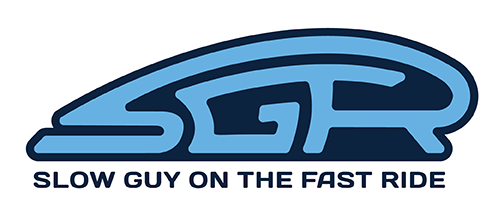The Wall Street Journal’s Jason Gay might be the only sports writer at a mainstream US newspaper who still covers cycling—professional and recreational; road, cyclocross, and mountain. He’ll even write about cycling in months other than July when the Tour de France takes place.
Gay writes about professional and college football (he went to the University of Wisconsin, but I hope Wolverines will keep reading), soccer, baseball, basketball, tennis, and golf.
His columns can be entertaining (Why do the characters in HBO’s White Lotus always eat at the hotel restaurant?); funny (yes, I, too, have a New Year’s resolution to understand what Minecraft is); and honest and sensitive.
(The Wall Street Journal requires a subscription to read articles.)
In between his day job, parenting, and trying to get outside and ride, he recently released his second book, “I Wouldn’t Do That If I Were Me.”
In the past few years, he has written about and interviewed the sport’s best riders, including:
- Tom Pidcock, a British superstar riding for Team Ineos.
- Justin Williams, an American criterium champion and owner of the L39ION cycling team.
- Anna van der Breggen, perhaps the best female cyclist of all time.
- And many others, including Lachlan Morton, Phil Gaimon, Mark Cavendish, Wout van Aert and Mathieu van der Poel.
Like many riders, Gay came to the sport later in life. He said he was the last kid in his neighborhood to learn how to ride a bike—a Columbia Silver Fox with a yellow banana seat.
If not for his wife, he never would have gotten into road cycling. She was a member of the New York Cycle Club and would go out on long rides into New Jersey and beyond on the weekends. He eventually decided to join her.
“At the time I heard about this I thought it was crazy. I didn’t think anyone should be riding a bike in and around New York City,” he said. “But in the great tradition of people saying they’ll never do something and it becoming a huge part of their lives, I fell for it. I went from the guy saying I’ll never wear spandex to three weeks later dressed head-to-toe in spandex.”
He eventually did some road races in New York City, which take place in Central Park or Prospect Park in Brooklyn early on Saturday mornings where he peaked at the “Cat 4” level of racing and sometimes barely hung on the to the back of the peloton.
I was right there with you, Jason.
(USA Cycling has five categories of racing where “Cat 5” is beginner and “Cat 1” is very, very, very fast.)
I’ll let him speak for himself about the sport of professional cycling. The interview has been lightly edited for clarity.
Jonathan E. Kaplan: How much are you riding these days?
Jason Gay: Covid for me was a real catalyst to get back on the bike at time when people were needing to get outside, it was a real essential thing to get on the bike, forget about everything and just sort of go. I’m a big believer in the mental and the physical component of cycling. The mental part being more important than the physical part. It does something for me that no other physical thing does…it works every time. I really cherish that. I ride a lot more now than I did a few years ago. We moved from NYC to Baltimore and there’s a lot of riding around here. You can get out of town and be riding on country roads in 10 or 15 minutes. That’s a real pleasure one of the best parts of moving here.
JEK: What do you love about pro cycling?
Jason Gay: There’s nothing else like it. Anybody who follows others sports and also follows cycling knows that the ratio of crazy to normal is much higher. There are more crazy things happening in cycling than any other sport I can think of. It’s a sport of real eccentrics. It’s a sport full of incredible scandal, incredible accomplishments. It’s a sport rich with characters, regrettable moments, all of which are ingredients for real fun as a reporter and storyteller, but also just fun from a fan standpoint.
Cycling is never boring.
You might think about it, look at these races that are five or six hours long, how could that be exciting? But anyone who gets just a minimum amount of exposure knows how it becomes this really compelling thing. I’m happy to say that none of that has diminished over time. I love it just as much if not more than when I first started following it.
JEK: What needs to change about pro cycling?
Jason Gay: Sustainability, in a word.
It’s a sport that has not a great deal to offer in terms of financial stability to people who do it for a living, men and women, people who are important contributors to the sport, important contributors to teams and events. It is hard for them to make a living at it.
There is money in the sport.
We know this from the value of sponsorships, the value of media rights. But we are still in a world where many riders are scrambling around to find contracts at the end of the year are not given much in the way of a guarantee that they are not going to be able to have a sustainable life.
Even the people at the very high, high elite championship level; even the greatest cyclists in the world are paid a heck of a lot less than a mediocre mid-reliever in baseball is kind of embarrassing.
The sport has a lot to do in terms of improving the way it compensates talent, and I haven’t even gotten to women’s cycling where there have been some strides in financial fairness, but it still is woefully behind.
The real potential for cycling exists in combining events. We’ve seen this in sports like tennis where, one plus one equals three. Having the men’s and women’s tournaments combined at the majors (like Wimbledon or the US Open) and having the double fan bases and excitement, and the cross-section of people that care about all of them is a really good thing.
That is a thing for cycling to investigate more fully and development. There’s certainly potential there and for sponsors that they’re getting a comprehensive product. Anything that is going to support individual cyclists to make a living and do what they love often at great risk is the most important thing.
JEK: Is road cycling permanently damaged?
Jason Gay: I’d hesitate to say anything is permanently damaged. Sports, like cycling, pun intended, go in cycles. Things that we don’t care about today might care about a great deal five years from now.
Road cycling as an activity has been impaired because too many people feel too unsafe on the roads. That’s because there are endless distraction in automobiles and it is hard to read the paper these days without finding some incident of cyclists being injured or worse. More people are scared to do it.
I’m someone who rides a lot less on busy roadways than I did 10 years ago. And I think part of it is getting older and part of it is becoming a parent, that’s the main reason, for sure. But I know what it is like for people in their cars now, whether it is their phones, their simultaneous phone and text conversations, the potential number of distractions that exist in vehicles nowadays is staggering.
I don’t like that at all.
I want to find safest possible roadways and for me that’s going to be roads with the fewest amount of cars possible. So that has opened the door to gravel cycling, one-day events, and things that are off-road.
I would never say that road cycling is “DOA” because it is an amazing sport, and has great history in this country. There have been great road racing in this country. Same with criteriums. There’s a lot of energy in criterium racing right now in the United States, which also is a fantastic sport. I would love to see that continue.
(Criteriums are races around an office park, for example, where each loop is around a mile long with a few corners, which elevate the chance for crashes but also requires skillful handling of a bike and an understanding of physics—leaning into the turns with the outside pedal down can take practice.)
We’re not in the doomsday of road racing. We will see it return.
You have to give people the feeling that it is a sport they can do safely. I mean that from the fan or supporter standpoint. The lifeblood of cycling in the US, I believe, is going to be some sort of combination of events that combine elite level cycling, that you or I would not ride in, with participant cycling, where you and I could ride either the whole course or a fraction of the course, that’s ridden by the best. You want to create an environment where people can train and do that sort of thing.
The conversation about cycling we’re having here is about cycling as a sport. But cycling is also a life for people. It is a means of transportation, a means to go to work, school, shopping. Those things are vital to cycling. All those things that we spoke about regarding safety are just as important to people who are getting on their bike just to get where they’re going, that stuff has to happen for them too.



